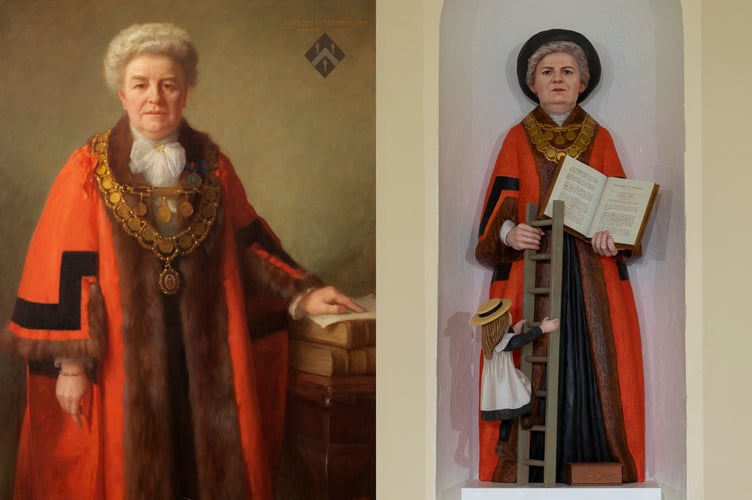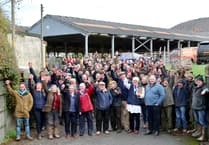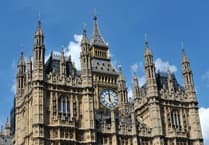First Minister of Wales, Eluned Morgan MS, paid tribute to Wales’ first female mayor during a visit to Brecon today.
Gwenllian Morgan was the first woman in Wales to be elected to take part in local government and serve on a borough council in 1907 before becoming Mayor of Brecon in 1910-1911.
Gwenllian was a noted social campaigner both locally, nationally and internationally for causes including peace, temperance, votes for women, wider access to education and health.
Her pioneering political work and campaigning activities inspired the creation of a sculpture in her memory which has gone on display at Brecon’s y Gaer Museum & Art Gallery. The First Minister spoke at the Dedication of the artwork and animations which tells Gwenllian’s inspiring story.

The First Minister said: “As Wales’ first woman mayor, Gwenllian was a pioneer and role model to so many women. She was also a local champion and leader in the 1923 Welsh Women’s Peace Petition movement, a group that continues to inspire people in Wales to this day.
“Gwenllian contributed so much here in Brecon and further afield and gave the women of Brecon a voice. It’s fantastic to see her achievements now honoured permanently here in Brecon - Gwenllian is rightfully taking her place in the pantheon of remarkable Welsh women.”
The Gwenllian Morgan Sculpture and Animations were commissioned by the Brecon Story Network and given for display in the Victorian Assize Court which is at the heart of the y Gaer Museum & Art Gallery.
Carla Rapoport and Elizabeth Jeffreys, of the Brecon Story Network, noticed that the newly refurbished Courtroom was filled with busts and oil portraits of men only.
"We felt a female presence was needed and found the ideal candidate in Gwenllian Morgan who a hundred years ago was known locally, nationally and internationally for her work on bettering the lives of others. Since then, her story has been largely overlooked or forgotten,” said Elizabeth Jeffreys.
“This project aims to change that by highlighting her many achievements as well as her role in furthering the cause of women’s full involvement in public life.
“Gwenllian was much more than Wales's first woman mayor; she was and is an inspiring role model for women as a national pioneer.”
Carla Rapoport added: "We realised that the central niche at the back of the courtroom offered the perfect location for a sculpture of Gwenllian, which would enable a meaningful and visible restoration of her story.
“We held a competition for designs in 2024 and happily, local artist Susan Adams presented the winning design," said Carla. "But the project couldn't have existed without the enthusiastic support of local funders, patrons, volunteers and y Gaer staff.”
Artist Susan Adams explained that she was attracted to the commission immediately for the opportunity to commemorate, “an outstanding woman who was well-loved and respected in her time but now neglected in my own local town of Brecon.”
She added: “I have a strong interest in story and symbolism and have long found the empty niches in churches and cathedrals a springboard for the imagination.
“The sculpture - in carved painted wood and filling the niche - echoes the medieval more than the post enlightenment rationality of the surrounding busts. A girl climbs a ladder supported by Gwenllian Morgan, suggesting how much she wanted to give women hope for the future.”
The Dedication of the Sculpture and Animations were welcomed by the current Mayor of Brecon Cllr Marie Mathews.
"Being a present-day successor to Gwenllian Morgan is both an honour and a responsibility,” she said. “Her legacy reminds me that leadership is not measured by authority, but by service, integrity, and the courage to pursue equality.
“The principles she championed remain vital today, guiding me to lead with compassion, purpose, and vision."
Welsh historian and writer Norena Shopland has been supporting the project while compiling a biography of Gwenllian Morgan. She told how she had been “struck by how a woman who rarely left her small Welsh town could have had such worldwide significance.”
“Not only did she change Welsh and British political history, but she also influenced powerful women such as Lady Constance Battersea, Lady Henry Somerset, and Frances Willard, the latter doyennes of the worldwide temperance movement,” the historian added.
“She wrote to women around the world, urging them to sign the temperance Polyglot Petition, one of the biggest petitions in history. International students and academics now come to Wales to study two famous 17th-century poets, Henry Vaughan and Katherine Philips, whom Gwenllian brought out of obscurity.
“Gwenllian may have lived in Brecon, but she touched the world.”
The life of Gwenllian Morgan has also inspired a pioneering community history project. In 1911, 910 women of Brecon and beyond signed their names and donated money to pay for a life-sized portrait of Gwenllian which still hangs in the town’s Guildhall. The presentation book with their names is on display in the museum. The Gwenllian Morgan Local History Project is a group of local volunteers who are researching the women and why they donated with the goal of publishing their results online and in print.
To join in or learn more, please email: [email protected]




Comments
This article has no comments yet. Be the first to leave a comment.